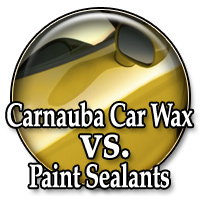Ever wonder why your neighbor’s car looks infinitely more gorgeous than yours? The secret could be that he knows how to pick the right car cleaning products to use even for DIY detailing. If you’re unfamiliar with the merits of polymer sealant vs carnauba wax, you won’t know how to choose the appropriate item to keep your car looking just as good as your neighbor’s.
Carnauba Wax for a Thoroughly Impressive Appearance
It’s never enough to simply wash and scrub the dirt off your car. The extra step of paint protection is a necessary investment that will pay off big time in the long run. With a perfectly preserved paint job, you can forget about repainting your car in the years to come.
Which Product Should You Choose?
Natural carnauba wax (we’ve mentioned it before in relation to motorcycle detailing) and synthetic polymer sealant are equally effective at sealing in your car’s freshly-cleaned look and protecting the clear coat. Both are equally good at creating a hydrophobic layer. This layer protects your car against water, the elements, and road contaminants. Both also add vibrancy to your car’s paint job. How? By giving it an extra sheen and allowing the surface to reflect more light.
Differences Between Carnauba Wax and Polymer Sealant
Carnauba wax is a natural protector. It gives your vehicle a “three-dimensional” shine that makes the colors deeper, darker, and richer. Carnauba is derived from a type of palm tree that is native to Brazil. Sometimes producers also mix it in with bee wax and other natural substances. If you have a dark-colored vehicle, carnauba wax might be the better option for you. The downside of carnauba wax is its tendency to thin and wear off after a shorter period of time in comparison to polymer sealants.
Polymer sealants are made from plastic-based formulas instead of organic substances. They can hold up against worse weather for longer. Using a polymer sealant will also mean that you might not have to have your car detailed for longer, because it will certainly retain its like-new appearance for months and months. Depending on the weather conditions in which you drive, a good coating of polymer sealant can last up to four months. The bad thing about polymer sealants is that they don’t produce that slick, glossy finish that carnauba wax can.
Moreover, instead of masking small defects and minor imperfections, polymer sealants can actually call attention to the things that make your car less beautiful to look at. Carnauba wax can downplay the swirls in the paint job and hide the scratches and scrapes that show all across the car’s surface.
Which Product Is Better for Your Vehicle?
To find out, it’s best to experiment with both and test their capabilities on your own. Durability is certainly a strong point for polymer sealants, but the beauty that carnauba wax can give your vehicle is also something to consider. Whichever product you eventually choose, be sure to follow the package instructions for proper application and storage of the leftover product.
And if you don’t feel like DIY job today, give us a call or schedule your appointment online!
Enjoyed this post? Sign up for our newsletter to receive more valuable tips, ideas, coupons, and extras!





